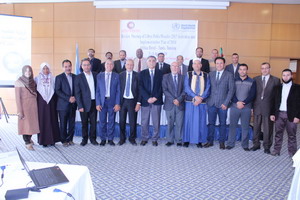 26 April 2018 – On 3 April 2018 an annual review meeting on the activities of the Polio Eradication Initiative and Expanded Programme on Immunization programmes was convened in the WHO country office for Libya in Tunis. The meeting was conducted from 3 to 6 April 2018, with a total of 24 participants from Libya. Representatives from the Government of Libya, National Center for Disease Control, National Immunization Technical Advisory Group (NITAG), Provincial Surveillance Officers, Pediatricians from major hospitals in Libya, UNICEF, International Organization on Migration and WHO country and regional staff attended.
26 April 2018 – On 3 April 2018 an annual review meeting on the activities of the Polio Eradication Initiative and Expanded Programme on Immunization programmes was convened in the WHO country office for Libya in Tunis. The meeting was conducted from 3 to 6 April 2018, with a total of 24 participants from Libya. Representatives from the Government of Libya, National Center for Disease Control, National Immunization Technical Advisory Group (NITAG), Provincial Surveillance Officers, Pediatricians from major hospitals in Libya, UNICEF, International Organization on Migration and WHO country and regional staff attended.
Dr Jaffar Hussain, WHO Representative for Libya, inaugurated the meeting and spoke to participants on the importance of sustaining the goal of polio-free status Libya. He praised the 2017 supplementry immunization activities campaign coverage and congratulated the Ministry of Health and National Center for Disease Control of Libya for the successful achievements. He also stressed the importance of strengthening and enhancing surveillance and immunization activities. He talked about the need to integrate other diseases under surveillance with the polio eradication programme.
The objectives of the meeting were to:
- review 2017 Libya acute flaccid paralysis and measles surveillance implementation plan and roadmap plan for 2018
- enhance AFP and measles surveillance performance indicators
- integrate and harmonize EPI/PEI activities in light of the Global Polio Endgame Strategy 2014–2018
- agree on action points for implementation of Measles elimination program and agree on key priorities for 2018–2019.
Participants were able to review 2017 implemented activity plans and identify the strength and gaps in the programme and propose solutions for 2018 implementation plans.
One of the most critical issues discussed was the low NPEV rate and collection and management of stool specimen, the importance of stool adequacy, timely stool collection, and timely transport of the specimens immediately upon collection (by any means) to Tunis. In addition, they discussed the need to report true AFP cases and enhance surveillance.
It was agreed that AFP surveillance should be systematic and continuing data collection to demonstrate the reality of Libya polio-free status.
WHO Libya country office agreed to ensure the implementation of 2018 planned activities by conducting capacity-building, logistic supplies, staffing and operational costs for specific planned activities.


